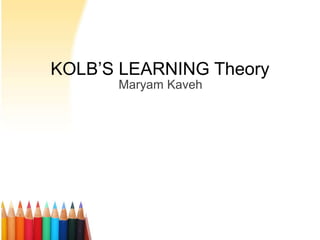Kolb learning
•Télécharger en tant que PPTX, PDF•
24 j'aime•18,315 vues
Kolb learning
Signaler
Partager
Signaler
Partager

Recommandé
Recommandé
Contenu connexe
Tendances
Tendances (20)
Information Processing Model and its implications in learning and teaching

Information Processing Model and its implications in learning and teaching
Similaire à Kolb learning
Honey and Mumford learning stylesDo you know your preferred learning style?

Do you know your preferred learning style?Temitope Adelekan MBA, ITIL Expert, Prince2, COBIT 5,PMIIM
Similaire à Kolb learning (20)
Experiential learning a Session by Dr. Nicholas Correa

Experiential learning a Session by Dr. Nicholas Correa
Strategies to develop creativity and critical thinking

Strategies to develop creativity and critical thinking
Dernier
Making communications land - Are they received and understood as intended? webinar
Thursday 2 May 2024
A joint webinar created by the APM Enabling Change and APM People Interest Networks, this is the third of our three part series on Making Communications Land.
presented by
Ian Cribbes, Director, IMC&T Ltd
@cribbesheet
The link to the write up page and resources of this webinar:
https://www.apm.org.uk/news/making-communications-land-are-they-received-and-understood-as-intended-webinar/
Content description:
How do we ensure that what we have communicated was received and understood as we intended and how do we course correct if it has not.Making communications land - Are they received and understood as intended? we...

Making communications land - Are they received and understood as intended? we...Association for Project Management
Dernier (20)
Unit 3 Emotional Intelligence and Spiritual Intelligence.pdf

Unit 3 Emotional Intelligence and Spiritual Intelligence.pdf
Python Notes for mca i year students osmania university.docx

Python Notes for mca i year students osmania university.docx
Making communications land - Are they received and understood as intended? we...

Making communications land - Are they received and understood as intended? we...
Interdisciplinary_Insights_Data_Collection_Methods.pptx

Interdisciplinary_Insights_Data_Collection_Methods.pptx
General Principles of Intellectual Property: Concepts of Intellectual Proper...

General Principles of Intellectual Property: Concepts of Intellectual Proper...
HMCS Max Bernays Pre-Deployment Brief (May 2024).pptx

HMCS Max Bernays Pre-Deployment Brief (May 2024).pptx
Sensory_Experience_and_Emotional_Resonance_in_Gabriel_Okaras_The_Piano_and_Th...

Sensory_Experience_and_Emotional_Resonance_in_Gabriel_Okaras_The_Piano_and_Th...
Basic Civil Engineering first year Notes- Chapter 4 Building.pptx

Basic Civil Engineering first year Notes- Chapter 4 Building.pptx
Kolb learning
- 1. KOLB’S LEARNING Theory Maryam Kaveh
- 2. Who is Kolb ? David A. Kolb (born 1939) is an American educational theorist whose interests and publications focus on experiential learning, the individual and social change, career development, and executive and professional education. He is the founder and chairman of Experience Based Learning Systems, Inc. (EBLS), and a Professor of Organizational Behavior in the Weatherhead School of Management, Case Western Reserve University, Cleveland, Ohio.
- 4. Learning Cycle Kolb's model therefore works on two levels - a four-stage cycle: • Concrete Experience - (CE, feelings, kinesthetic responses) • Reflective Observation - (RO, watching, analyzing) • Abstract Conceptualization - (AC, critical thinking) • Active Experimentation - (AE, doing)
- 5. Learning Cycle • Concrete Experiencers like to learn by experiencing. They like games and role playing. They learn from and with other people and value discussion and feedback. • Reflective Observers learn by reflecting. They like to look at things carefully from a variety of perspectives. They enjoy lectures and objective tests where knowledge is demonstrated. • Abstract Conceptualizers are logical and systematic. They appreciate deductive thinking based on their careful understanding. They like theory and appreciate alone study time. They create ideas that are clear and well- structured. • Active Experimenters learn by doing. They like to practice and try new things. They are not afraid of taking risks and are known for getting things done. They appreciate small group discussions and individual self-paced projects or activities.
- 6. Learning Styles Four-type definition of learning styles, (each representing the combination of two preferred styles, rather like a two-by-two matrix of the four-stage cycle styles, as illustrated below), for which Kolb used the terms: • Diverging (CE/RO) • Assimilating (AC/RO) • Converging (AC/AE) • Accommodating (CE/AE)
- 8. diverging • Between “concrete” and “reflective” = diverging • They tend to : recognize problems brainstorm options gather information strong in the arts work in groups receive personal feedback Generate lots of ideas • And they are sensitive. interested in people open-minded be imaginative be understanding
- 9. assimilating • Between “reflective observation” and “abstract conceptualization” = assimilating • They tend to: plan create models define problems develop theories be patient • And enjoy of: Take a concise, logical approach. good clear explanations rather than practical opportunity. wide-ranging information and organizing it a clear logical format. ideas and abstract concepts. information and science careers. reading, lectures, exploring analytical models, and having time to think things.
- 10. converging • Between “abstract conceptualization” and “active experimentation” = converging • They tend to: solve problems make decisions reason deductively be logical find solutions to practical issues. technical tasks Find practical uses for ideas and theories. experiment with new ideas. work with practical applications Use deductive reasoning to solve problems • and are less concerned with people.
- 11. accommodating • Between “active experimentation” and “concrete experience” = accommodating • They tend to : get things done lead take risks initiate be adaptable and practical 'hands-on' learning. intuition rather than logic. take a practical, experiential approach. new challenges and experiences. learn which involves action and initiative. work in teams to complete tasks. Uses targets and works in the field. Good at actively engaging with the world and actually. doing things instead of reading about and studying them •
- 12. Doing (Active Experimentation - AE) Watching (Reflective Observation - RO) Feeling (Concrete Experience - CE) Accommodating (CE/AE) Diverging (CE/RO) Thinking (Abstract Conceptualization - AC) Converging (AC/AE) Assimilating (AC/RO)
